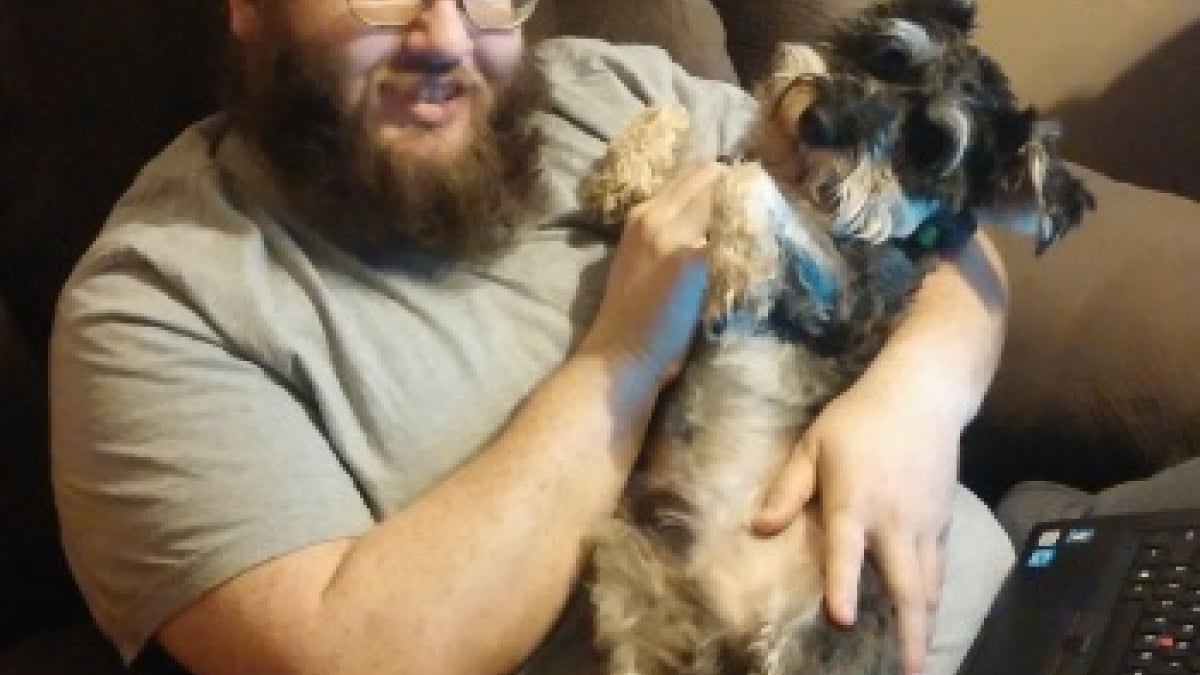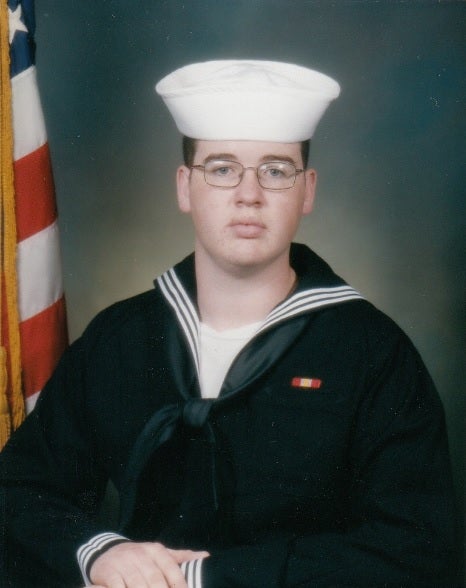Paralyzed vet finds healing in poetry

ASU student and veteran Brian Wickensimer does coursework on his laptop at home in Ohio with his dog Hemingway.
“They’re selling postcards of the hanging, they’re painting the passports brown / The beauty parlor is filled with sailors, the circus is in town.”
So begins what Brian Wickensimer — himself a sailor — calls his favorite poem, “Desolation Row” by Bob Dylan.
Wickensimer, an ASU Online student and a veteran, was recently accepted into a poetry master’s program in Vermont. Principal lecturer in ASU’s College of Integrative Sciences and Arts Patricia Murphy recognized his inherent talent as a student in her writing class.
“Brian’s work has a sophistication and maturity that I really appreciate,” she said. “His prose is so wonderfully styled, with careful attention to musicality, repetition and wry humor.”
Despite that sense of humor, Wickensimer is no stranger to desolation. He enlisted in the U.S. Navy at the age of 19 to escape a dead-end Rust Belt factory job.
“There are not a lot of opportunities for poor folks in southern Ohio,” he said. “And despite being 6-foot-2, I wanted to be a submariner.”
But life often has a way of thwarting the best-laid plans. Early on in boot camp, a devastating fall left Wickensimer with a paralyzed leg and bladder. Following the injury, he lived in a hospital for nine months while recovering.
He developed complex regional pain syndrome (a chronic pain condition most often affecting one of the limbs usually after an injury or trauma to that limb), post-traumatic stress disorder, depression and debilitating migraines. He still suffers from the headaches to this day.
Wickensimer's official Navy portrait.
“Your perspective of the world changes when you suffer an injury like mine,” he said. “You go from having one idea of a life to needing to find a completely new one. My path led to several suicide attempts. I couldn’t reconcile going from a runner to a paralyzed man.”
Battered but not broken, he forged on through years of therapy and mindfulness to emerge in “a good place in life.”
One thing that helped along the way was writing and reading poetry.
“When you reach your breaking point, where do you turn?” he said of that difficult time during recovery. “For me it has been Edna St. Vincent Millay, Dylan Thomas, E.E. Cummings and Etheridge Knight. Of course, there are many others.”
Back home in Ohio, Wickensimer heard about the educational opportunities offered through ASU Online. With help from the G.I. Bill, he enrolled in College of Integrative Sciences and Arts' liberal studies track and got to work.
A flexible assignment schedule to accommodate his unique situation and invaluable support from individuals such as Jason Garcia with the ASU Disability Resource Center helped Wickensimer to excel.
Murphy observed his progress with delight.
“He wrote honestly and with such depth of description about his life at home. I felt enriched by his writing,” she said. She returned the favor by writing a letter of recommendation when he expressed interest in continuing on to a master’s program.
Wickensimer remarked that his time as an ASU Online student has been both “enlightening and frustrating,” but ultimately “worth it.”
Through it all, he has maintained a sense of humility and developed a deeper appreciation for all life has to offer.
“I am no one special,” he said. “I am just a paralyzed veteran that works around his disability to live life.”
More Arts, humanities and education

Grand Canyon National Park superintendent visits ASU, shares about efforts to welcome Indigenous voices back into the park
There are 11 tribes who have historic connections to the land and resources in the Grand Canyon National Park. Sadly, when the…
ASU film professor part of 'Cyberpunk' exhibit at Academy Museum in LA
Arizona State University filmmaker Alex Rivera sees cyberpunk as a perfect vehicle to represent the Latino experience.Cyberpunk…

Honoring innovative practices, impact in the field of American Indian studies
American Indian Studies at Arizona State University will host a panel event to celebrate the release of “From the Skin,” a…
